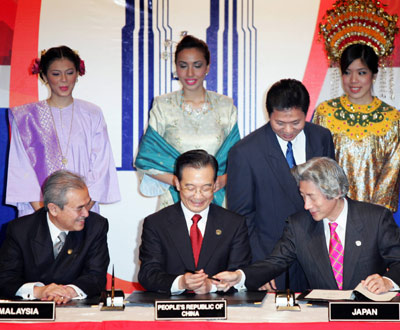|
AP: China leader still displeased with Japan
(AP)
Updated: 2005-12-15 08:38
Given the frosty relations between China and Japan, their leaders can't
really be pen pals.
Chinese Premier Wen Jiabao made clear his continuing displeasure with
Japanese Prime Minister Junichiro Koizumi when he ignored Koizumi's request to
borrow his pen during a signing ceremony Wednesday at a regional summit in
Malaysia.

Japanese Prime
Minister Junichiro Koizumi (R) returns the pen to Chinese Premier Wen
Jiabao (C) as Malaysia Prime Minister Abdullah Ahmad Badawi looks on
during the signing of the declaration on the East Asia Summit during the
11th ASEAN Summit in Kuala Lumpur December 14, 2005.
[Reuters] |
Wen had already refused to formally meet one-on-one with Koizumi at the
summit amid a feud over the Japanese leader's visits to a shrine honoring war
dead, including 14 Class A WWII war criminals.
As leaders of the newly inaugurated East Asia Summit were signing a
declaration on the group's establishment, Koizumi leaned over and asked to
borrow his pen.
Wen ignored him for several seconds until Malaysian Prime Minister Abdullah
Ahmad Badawi, smiling broadly, intervened to repeat the request. Wen then passed
the pen to Koizumi with a smile, but the snub was widely noted in an otherwise
uneventful ceremony.
Wen on Monday blamed Koizumi for the chilly relationship between their
countries because his five visits to Tokyo's Yasukuni shrine had "deeply hurt
the feeling of the Chinese people."
Koizumi remained defensive of his visits to the shrine after the summit
ended.
"I just don't understand why anyone should be criticized for offering
prayers," he told reporters. "It is absolutely not to glorify or justify war."
Wen ignored most of Koizumi's attempts at affability during the summit's
group photos and other public events, although the men did banter about seafood
during a lunch on Monday.
Abdullah tried to downplay the incident at a news conference, saying
China-Japan relations had not affected the summit.
"They were participating in the discussions. They were sitting together ...
they will sort it out," he said.
The goal of the East Asia Summit is to create a bloc to discuss issues that
affect the region. The group, which will meet annually, is comprised of
Australia, Brunei, Cambodia, China, India, Indonesia, Japan, Laos, Malaysia,
Myanmar, New Zealand, the Philippines, Singapore, South Korea, Thailand and
Vietnam. Russia attended as an observer, and is pushing to be a full member.
Among the issues discussed at the first summit were terrorism, bird flu and
free trade, though few concrete agreements were reached.
|